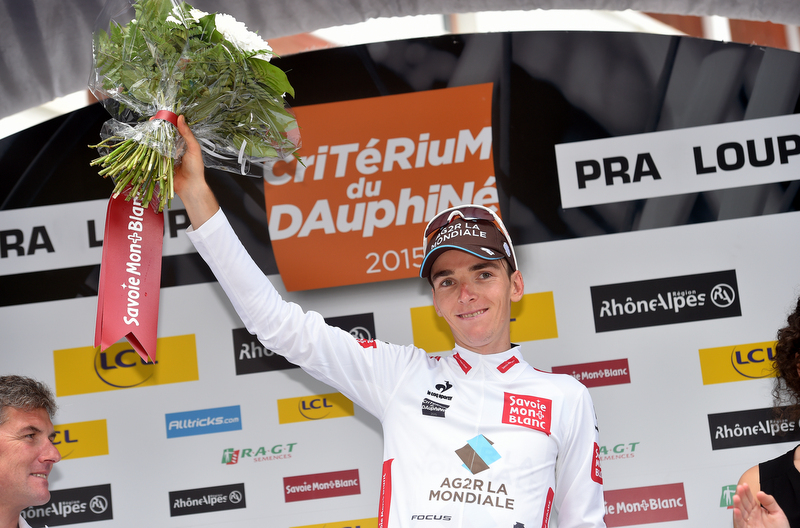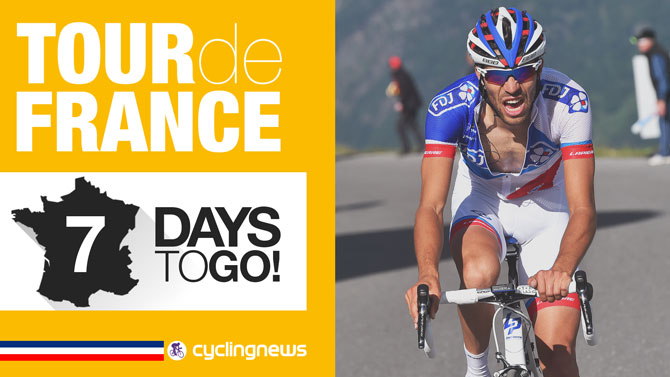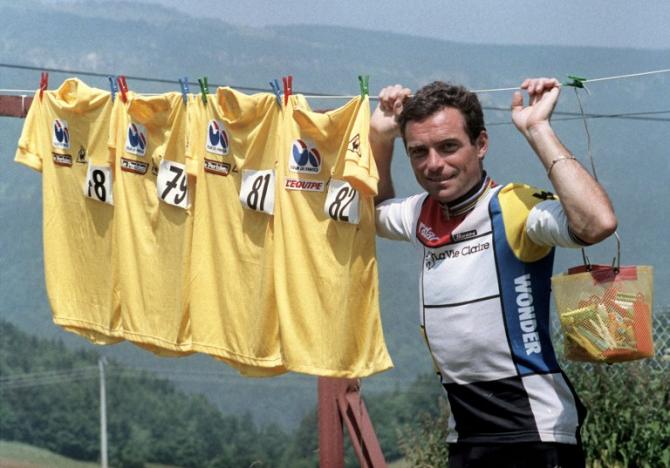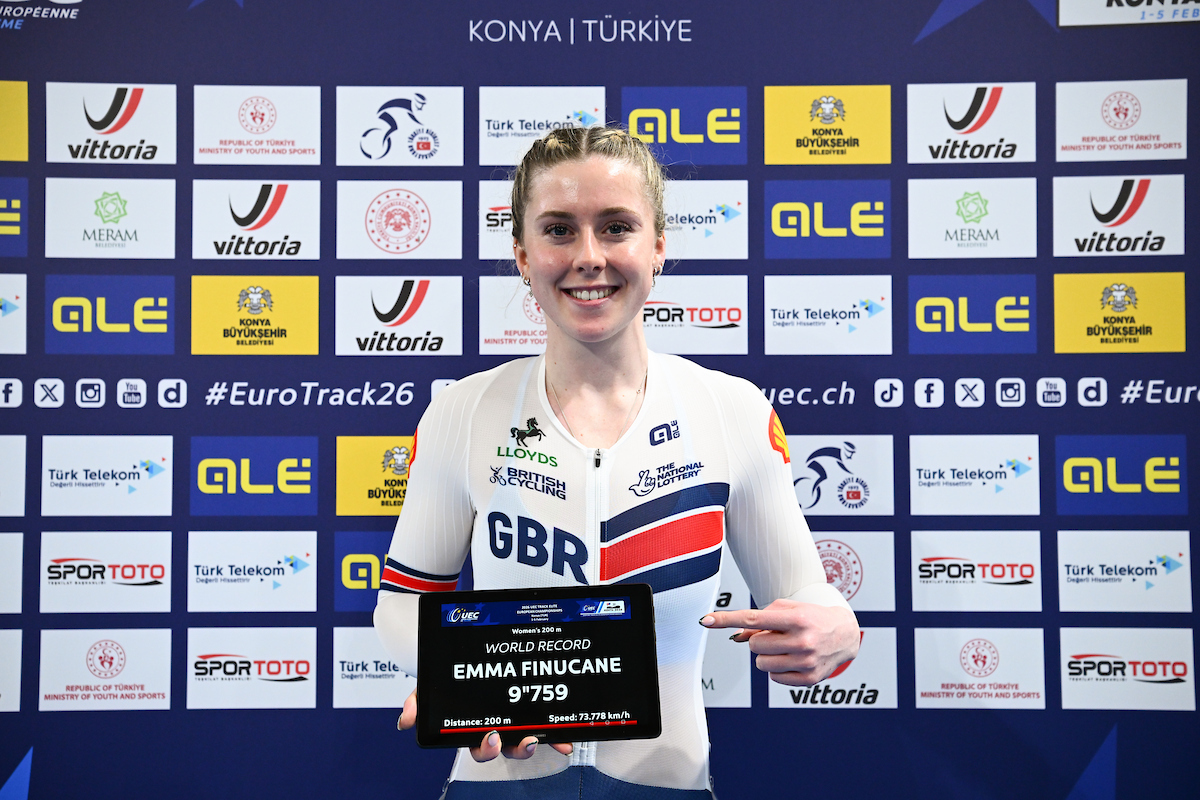Pinot leads French challenge at Tour de France
A look at French cycling since Hinault's 1985 win



At the 100th Tour de France in 2013, the sense of home resignation was such that France Télévisions held what amounted to a post-mortem before the race had even begun. “The Tour de France: Why can’t the French win it anymore?” they asked. It had the air of a rhetorical question.
That pessimism was not altogether misplaced. Three weeks later, the best-placed Frenchman, neophyte Romain Bardet, finished in 15th place, more than 26 minutes down on Chris Froome, who had, to all intents and purposes, been riding in a different race. Pierre Rolland reached Paris almost an hour behind. Thibaut Pinot, 10th the year before, abandoned in the third week. “The French didn’t dazzle,” L’Équipe said with understatement.
Yet two years on, and just as the once unthinkable milestone of 30 years going by without a home winner has been reached, there is a decidedly more optimistic air to the noises emanating from France. The topic of a panel debate on the Stade 2 magazine show last week, for instance, was “Pinot: Can he win the Tour de France?” Not quite “Yes We Can,” but progress nonetheless after thirty years of hurt.
The reasons for such guarded optimism are clear. Twelve months ago, Jean-Christophe Péraud and Pinot became the first home riders on the Tour podium since Richard Virenque in 1997, and it marked the first time since 1984 that two of the top three finishers were Frenchman. Bardet, meanwhile, continued his progress with a pugnacious sixth place finish.
Perhaps as importantly, the emerging generation of French talent has shown a healthy appetite for top tier racing beyond the month of July. Pinot won mountain stages at the Tour de Romandie and Tour de Suisse this year, Bardet at the Critérium du Dauphiné. Pierre Rolland placed 4th at last year’s Giro, while the Breton Warren Barguil, who makes his Tour debut this year, has already enjoyed two fine outings at the Vuelta a España in his short career to date.
1985 and all that
When Bernard Hinault stepped off the top of the podium after claiming his fifth Tour win in 1985, nobody could have imagined that three decades on, no other Frenchman would have emulated him. Indeed, for all his diplomatic words about working for Greg LeMond, Hinault undoubtedly expected that he would be back in yellow a year later.
The latest race content, interviews, features, reviews and expert buying guides, direct to your inbox!
No matter, the 1986 Tour marked the emergence of an apparent successor in Jean-François Bernard, a stature that seemed assured when he moved into yellow with a dominant showing in the Mont Ventoux time trial a year later. Outmanoeuvred by Stephen Roche and Pedro Delgado – not to mention the Systéme U team of Laurent Fignon – on the road to Villard-de-Lans, however, he ended the race in third overall and would never scale such heights again.
Before his 29th birthday, the Great White Hope of French cycling had already been repurposed as a deluxe domestique for Miguel Indurain. “I don’t love the bike enough to live for it 100 percent,” Bernard admitted to L’Équipe in 1992, a comment that did little to dispel the growing school of thought – one often propagated by Hinault himself – that young French riders simply did not work hard enough.
The late Laurent Fignon, of course, came closest of all to ending what was not yet a drought in 1989, when he led the Tour to the final day only to lose yellow by eight seconds to LeMond following in the concluding time trial on the Champs-Élysées. LeMond, equipped with tri-bars and aerodynamic helmet, saw off Fignon, who rode a more conservative low-profile bike with his ponytail flapping in the wind.
The irony was Système U directeur sportif Cyrille Guimard had been one of cycling’s great innovators, tactically and technologically, for the previous decade, leading Fignon and Hinault to six Tour wins and ensuring that cycling held its own with football, rugby et al in the early 1980s era of La France qui gagne. A gross simplification it may have been, but the image of the 1989 Tour that passed into posterity was of France now being overtaken by cycling’s ‘new world.’
In his 2009 autobiography, We Were Young and Carefree, Fignon suggested that French cycling was surpassed in other spheres, too, as the 1990s arrived and EPO use became diffuse in the peloton. Yet it would be a distortion of history to claim that this development is to blame for the lack of a French Tour winner in that period
After all, Richard Virenque, second in 1997, admitted to doping three years later during the Festina trial. Laurent Jalabert’s 4th place in 1995, meanwhile, had raised misguided hopes – “Laurent, C’est ton Tour!” was Vélo Magazine’s famous headline – that he would be the man to topple Miguel Indurain a year later. In 2013, a French Senate inquiry revealed that a retrospective analysis of Jalabert’s stored samples from the 1998 Tour had returned traces of EPO.
After the Festina Affair of 1998, however, it is apparent that French cycling did, at least generally, react with more rigour than most, hoping (naively, in hindsight) that the scandal would mark a sort of Year Zero for cycling at large. The spate of arrests during the 1998 Tour and France’s introduction of more stringent anti-doping laws seem to have been a Damascene conversion of sorts for some team managers, while the implementation of the suivi longitudinal in 1999, almost a decade before the biological passport, also contributed to the cultural shift.
Within weeks, Jean-Cyril Robin would note pointedly that the memo hadn’t gone much beyond the border. The performances of Rabobank at the 1999 Critérium International prompted him to speak of “Le cyclisme à deux vitesses” – two-speed cycling – and it soon became an article of faith that the French stance on doping contributed heavily to the fallow period that followed the turn of the millennium.
Beyond a smattering of optimistic souls, there were certainly comparatively few willing to bang the drum for the likes of Sandy Casar or David Moncoutié as future Tour winners despite their encouraging early outings in the professional ranks. In the ten years after the 1998 Tour, only two Frenchmen who hadn’t been banned as part of the Festina affair – François Simon (2001) and Cyril Dessel (2006) – would finish in the top ten overall.
“Generation Mendrisio”
In the years following Hinault’s last Tour win, the general malaise at the top level of French cycling came to be reflected, too, at underage level. After Richard Vivien in 1987, no Frenchman won the amateur Worlds road race before it was phased out in the mid-1990s. It was replaced by the under-23 event, which was dominated by Italian-based riders in its early years, and it would take a decade for France to take its first medal in the event. In 2009, however, Romain Sicard took the rainbow jersey, followed by Arnaud Démare two years later. Under the stewardship of Bernard Bourreau – since promoted to oversee the senior team – the French under-23 squad began to supersede Italy as the point of reference in the espoirs ranks.
As journalist Pierre Carrey noted in the excellent Nouveau Cycle, a compelling triptych of portraits of Pinot, Bardet and Péraud, published last year, those 2009 World Championships were, in hindsight, something of a watershed. Pinot was part of the under-23 team that helped Sicard to victory, alongside his future FDJ teammates Arthur Vichot, Alexandre Geniez and Arnaud Courteille, while the younger Bardet had only narrowly missed out on selection. Moreover, at 32 years of age, the mountain biker Péraud was taking his first, tentative steps as a top-level road rider, placing 12th in the time trial.
“‘Generation Mendrisio’ was born,” Carrey wrote of those 2009 Worlds. “In July 2014, its principal players, Jean-Christope Péraud included, could show themselves […] After many years, it was finally their turn.” The question now, of course, is whether any of the troika of French stars from last summer can make the greatest leap of all and bring an end to thirty years of hurt.
Perhaps understandably, given his advanced age, Péraud is the man whose maillot jaune hopes have received the shortest shrift from the observers in France, despite the fact that he was the man who finished closest to Nibali a year ago. True to his humble persona, Péraud himself has been the first to champion the aspirations of the younger generation above his own, accepting that his own podium finish of a year ago was due in part to the curious circumstances of a race that saw its two biggest favourites crash out in the first ten days.
“I don’t envisage winning the Tour,” Péraud said at the beginning of 2015. “I don’t have the youth of Pinot or Bardet.” He did, however, have the presence of mind at Critérium International to time his effort on the Col d’Ospedale better than Pinot and deny the FDJ man victory. Péraud’s campaign since has been mixed, however, and his abandoning the time trial at the French championships did not augur well a week from the Tour.
The burden of leadership at Ag2r-La Mondiale instead seems likely to fall upon Bardet, who has performed well across a variety of terrain in 2015, placing 6th at Liège-Bastogne-Lìege between solid showings in Trentino and Romandie. A daring descent off the Col d’Allos yielded a fine stage win at Pra Loup during the Dauphiné, though a crash the following day limited him to sixth place overall.
In theory, at least, the punchy opening week of this Tour ought to suit Bardet, though one senses that he will need to employ considerable invention if he is to better his showing of a year ago, given the presence of Chris Froome, Nairo Quintana, Vincenzo Nibali and Alberto Contador in the field, not to mention Pinot and Tejay van Garderen,
Pinot
Of the trio, Pinot seems the most likely candidate for a podium finish, both in terms of his pedigree and his performances thus far in 2015. While FDJ manager Marc Madiot would like his leader to race more often in the Coupe de France, the influence of his brother and coach Julien has seen Pinot race predominantly at WorldTour level over the past three years, a far-sighted tack that saw him make few additions to his palmarès but gradually add horsepower to his engine.
This season appears to have signalled a leap in quality. A leader rather than a follower at Tirreno-Adriatico, Pinot claimed mountain stage wins at both the Tour de Romandie and the Tour de Suisse, and led the latter into the final time trial before slipping to fourth overall. The ratio of mountaintop finishes to time trialling miles is considerably greater at the Tour – there is more than a hint of a parcours that was designed with Pinot very specifically in mind.
The paradox for Pinot, even on this course and in this form, is that he could very conceivably perform better than he did a year ago yet fall short of repeating his third place finish. Whatever happens, however, the chastening experience of 2013 Tour ought to stand to him. 10th place on his stylish debut in 2012 had heightened the expectations around Pinot, but a calamitous descent of the Port de Balès on the first day in the Pyrenees saw him lose six minutes and he was long out of the GC running by the time illness forced him out in the third week.
It marked the first true and very public setback of an amateur and professional career that had followed a seemingly flawless upward trajectory to that point and, to add insult to injury, members of the French press – rather unfairly, it should be noted – awarded him the Prix Citron as the least helpful rider of the race. On the bike, Pinot responded by bouncing back quickly to place 7th at the 2013 Vuelta before riding onto the podium at the 2014 Tour. Off it, he showed no rancour in his dealings with the home media, gladly playing up his allegiance to Paris-Saint-Germain and his love of his native Vosges when the occasion demanded.
During that Stade 2 discussion on Pinot, Laurent Jalabert – yes, him – was the voice of reason when he reminded his fellow panellists of the presence Froome, Contador, Nibali and Quintana. “That’s the problem for Pinot and Bardet really, those four guys in front of them,” he said.
Europcar manager Jean-René Bernaudeau struck a more optimistic, almost romantic note. “If Pinot can get to the foot of the Pyrenees without too much of a deficit then he’ll be a big favourite. He has the temperament and he takes risks. The history of the Tour is made by panache,” he said.
Asked to name his favourite for the Tour, however, Bernaudeau plumped for another French name. “Pierre Rolland,” he smiled. Through France’s 30 years of hurt, even on the darkest of days, the ability to dream has never died.

Barry Ryan was Head of Features at Cyclingnews. He has covered professional cycling since 2010, reporting from the Tour de France, Giro d’Italia and events from Argentina to Japan. His writing has appeared in The Independent, Procycling and Cycling Plus. He is the author of The Ascent: Sean Kelly, Stephen Roche and the Rise of Irish Cycling’s Golden Generation, published by Gill Books.
